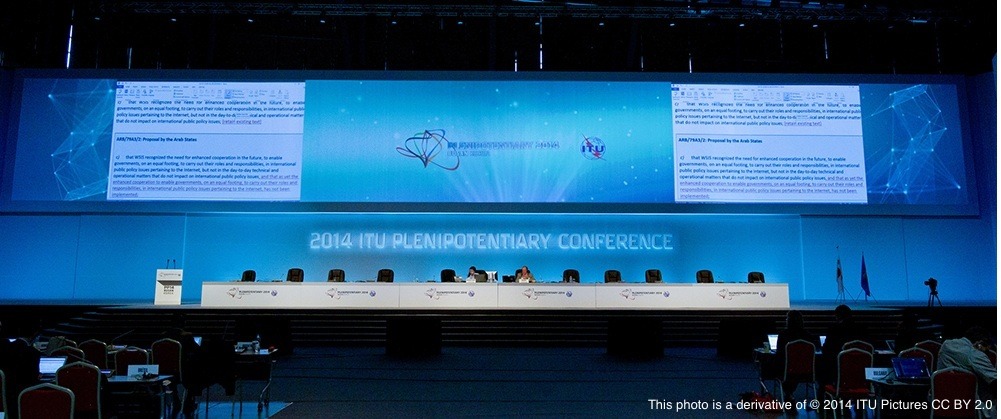By now, we have all received news of the outcomes of PP-14 and breathed a collective sigh of relief. The meeting was, in many respects, just as Secretary General Toure wished it to be – an election of its officers, an opportunity to set its agenda going forward, a budget exercise and a forum for the ITU Member States to share concerns and test policy responses. There were, to be sure, proposals relating to the Internet by some Member States that, with a different leadership approach, could have fractured the meeting. But, aided by the congenial and efficient leadership of the Conference Chair, Wonki Min of South Korea, and the hard work of meeting facilitators, there was a mostly calm discussion of sometimes widely divergent views of how the Internet should be governed. At the close of the meeting, those proposals were tabled, limited in scope or moved to “appropriate fora.”
That said, there were a number of issues that were decided and a number left undecided that will have an impact going forward (note Sally Wentworth’s blog.)
- The Conference did not reach consensus on the definition of ICTs; this may be an ongoing discussion point within the ITU.
- There was a lengthy debate about the WSIS and the role of the ITU in WSIS+10. We anticipate this discussion will continue at the UN General Assembly. I believe that a number of Member States may use the WSIS to once again seek a broader mandate, or the ITU and the UN at large with respect to Internet issues.
- Inclusiveness and transparency in ITU processes and meetings remains a major challenge.
- The so-called India proposal was not accepted; we should be prepared to see elements of this at the ITU and elsewhere. See again the comments of New Zealand warning of the far-reaching consequences of this proposal for the network.
Having noted the challenges that still remain post-Plenipot, I acknowledge, with appreciation to all parties involved, the progress made in the dialogue since the 2010 Plenipotentiary Conference. In a range of modifications to existing Resolutions, the emphasis in the documents coming out of the Conference is on collaborating with relevant organizations and stakeholders, raising awareness, collecting best practices, strengthening regional and international cooperation, and providing capacity building for developing countries. In fact, there seemed to be an underlying, sincere recognition by many governments that the ITU is working in a broader context of organizations and stakeholders and that collaboration is increasingly necessary. We should not underestimate the progress that this represents.
Additionally, I applaud the actions taken in Busan that support the social fiber of the Internet Community. It is for the greater community, of course, that we so passionately advocate for the protection and expansion of the Internet everywhere. The benefits of a connected world are real and sometimes urgent. One key example is the political support that emerged from the Plenipot for using ICTs to fight Ebola. To be sure, this is a complex health challenge that no single political Resolution will address – but the call from the ITU community, alongside the GSMA and the Internet Society, to facilitate the use of ICTs for the exchange of critical information was timely and important. See Resolution on using ICTs to fight Ebola.
My final observation: at the heart of the compromises reached was an acknowledgement that the ITU is not the only and, in a number of instances, not the appropriate forum for resolution of Internet related matters. As we wrote in our information submission to the Conference:
“Nor is there a single, global platform that can serve to coordinate, organize or govern all the issues that may arise….At its heart, the Internet is a decentralized, distributed system that allows policies to be defined by those who require them for their operations and that ensures that issues can be resolved at a level closest to their origin. The ecosystem draws its strength from the involvement of a broad range of actors working through open, transparent, and collaborative processes to innovate and build the network of networks that is the cornerstone of the global economy.”
I was privileged to be in Busan for the final week of the meeting and was struck, as always, by the smart, dedicated work of the Internet Society staff, Chapter and Org Members, and I* partners at the Conference and around the world. The Internet Society’s diligence and collaborative tone together with our principled and firm advocacy on behalf of the Internet and the Internet community was surely a factor in the success of the meeting. I have a hopeful sense, leaving Busan, that we may have taken some important steps in sorting the respective roles and responsibilities of key stakeholders in the Internet ecosystem.
As we look ahead to the WSIS, the IGF and numerous other fora in which debates on governing the technical, social and political issues related to the Internet will continue, the Internet Society is committed to the same level of collaboration, diligence and firm resolve to protect and advance an open, globally connected Internet everywhere, for everyone.
You can also get our reports from the ground from this year’s ITU 2014 Plenipotentiary

